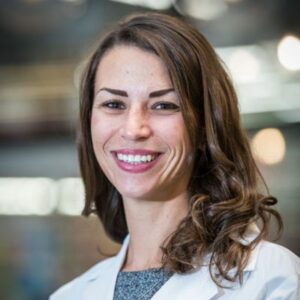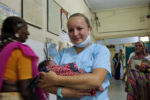
Table of Contents
You need at least 150 hours of clinical experience — specifically, direct patient exposure — in order to have a competitive med school application. The best clinical experience often comes from paid work you do during undergrad or gap years, but there are also volunteer opportunities worth considering as well.
I will take you through the best clinical experience to consider, what counts as clinical experience, and other valuable resources to get you where you need to be.
Use our comprehensive database of extracurricular opportunities for pre-meds to apply the activities that are best for you.
What Counts as Clinical Experience for Med School Applications?
Admissions committees typically define clinical experience as patient exposure in a clinical setting. For instance, shadowing a physician in a clinic does not count as clinical experience unless you directly engaged in patient care on a regular basis.
I advise you to have at least 150 hours of clinical experience to be an outstanding med school applicant. That’s 150 hours of patient interaction and patient care. And if you want to be as competitive as possible, 300+ hours would go a long way.
Note that there’s a lot of confusion out there on the Internet. I’ve seen many websites claim that all shadowing opportunities are clinical experience. But as a former AdCom and experienced medical school admissions advisor, I can tell you that it only counts as clinical experience if you regularly engaged in direct patient medical care.
10 Best Clinical Experiences to Consider
Below are the clinical opportunities that are best for developing you into a well-rounded medical school candidate and future physician.
I generally advise pre-meds to find paid clinical opportunities in healthcare settings — that way you can support yourself through college and gap years while getting the necessary experience for med school.
(Note: clinical volunteering positions are also great if you can find them, but there are other productive ways to volunteer that don’t involve clinical work.)
Read Next: Best Pre-Med Jobs
1. Emergency Medical Services
Working for emergency medical services is a top-tier method of getting patient exposure and real-life healthcare experience.
You have to get your Emergency Medical Technician (EMT) certification, which opens the door to working at private ambulance services, on-campus EMS, and even certain fire departments or municipal EMS services..
2. ER Technician
If you’ve earned your EMT certification, you can also work in emergency rooms as an ER technician. This involves taking patients’ vitals, assisting nurses and physicians, performing CPR, and more.
3. Medical Assistant
Medical assistants work with healthcare professionals to provide patient care. To become a medical assistant, you may need to complete a medical assistant training program and Certified Medical Assistant (CMA) certification course.
4. Certified Nursing Assistant (CNA)
A lot of pre-med students complete training programs to become certified nursing assistants or certified nurse aids. CNAs obtain clinical exposure by helping real-world healthcare professionals provide patients with daily basic medical needs.
5. Clinical Research Coordinator
Most research roles will count as “Research/Lab” experience on your AMCAS application, but clinical research coordinator (CRC) roles could also be placed under the “Medical/Clinical” category. It all depends on what your day-to-day responsibilities are.
I would say that most CRC positions usually involve interacting with patients (e.g. taking vitals, etc.). If that’s the case for you, then you can definitely mark your experience as “Medical/Clinical”.
On the other hand, some clinical research coordinators might spend most of their time looking at data and crunching numbers. If that describes your CRC experience, it’s probably better to mark it as “Research/Lab” on your AMCAS.
To land a CRC position, you typically need only a high school diploma, but you may be required to obtain other certifications to qualify.
Besides CRC, there’s another position you may be qualified for as a pre-med: CRA, or clinical research associate. CRA positions are similar to CRCs but are generally higher paid and require a Bachelor’s degree. They are also usually more focused on the actual research side of things, interacting with principal investigators (PIs), trial sponsors, and medical personnel to make sure proper research standards are being followed.
For this reason, CRA is a great option for pre-meds in need of more research experience, but is probably not suitable for those looking for clinical work
6. Medical Scribing
You can apply to an organization like ProScribe to get trained and employed as a medical scribe, which counts as clinical experience. As a scribe, you’ll be part of a healthcare team that gets patient exposure.
7. Hospice Volunteering
Research indicates that many medical students wish they had more experience dealing with end-of-life situations before entering med school. Volunteering at a hospice care provider might be one of the most valuable clinical experiences for prospective medical professionals.
Admissions officers value any hands-on experience you’ve had with dying patients and their family members, as long as you talk about it eloquently and respectfully in your application.
8. Phlebotomy
To become a phlebotomist at a doctor’s office or local hospital setting, you’ll need a CPT (Certified Phlebotomy Technician) certification. You’ll interact with many different patients as you draw blood and prepare it for testing.
9. Caretaker
According to an article published by the AAMC, serving as a caretaker can count as clinical experience for medical school. This kind of patient exposure can help hone your bedside manner and professional social skills interacting regularly with a single patient.
10. International Health Experiences
Pre-med students can gain clinical experience by participating in international volunteering, such as at a health clinic or by joining a Global Medical Brigade. These international experiences expose pre-med and pre-health students to different healthcare systems, unique sets of patients, and new cultural perspectives on well-being and illness.
If you’re looking into international volunteer opportunities, make sure you work with a sustainable, empowering organization. Voluntourism and unethical volunteering can actually hurt your application, so doing your research in advance is the best way to ensure you get the most out of the experience.
What If I Don’t Have Enough Experiences Before Senior Year?
A majority of med school students have taken at least one gap year. A gap year can help you get more clinical experience, among other benefits.
A post-bacc might also be helpful if you don’t have enough experience to have a competitive application. Even with great MCAT and GPA numbers, a post-bacc program can be a huge win for your med school application, as many programs also help you identify the pre-med extracurriculars you need to be competitive. Almost 1 in 7 med students have enrolled in a post-bacc pre-med non-degree program.
Read Next: The Best Medical Schools for Non-Traditional Applicants (2025)
Resources to Get You Started
There are some things you can do right now to get started boosting your application with high-quality clinical experience.
Browse our extracurricular database. This resource allow you to apply directly for employment and volunteering opportunities at organizations like ProScribe and Global Medical Brigades.
Advanced eClinical Training (ACT) can help you get more in-depth clinical experiences by providing 100% online certifications and training that you need to get certain clinical jobs. ACT credentials not only enhance your resume but also signify your dedication to patient care.
Brush up on more details of the Work & Activities section on the AMCAS. By taking the time to understand this application section, you’ll get a better idea of what extracurriculars you need to boost your odds of med school acceptance.
Seek out consulting for improving your application. Working with experienced Physician Advisors can greatly increase your odds of getting an interview and getting accepted. MedSchoolCoach’s Advisors help more than 2,000 future physicians every year, and 92% of our students get accepted (compared to the 41% overall acceptance rate of all med school applicants).
Read Next: The 32-Hour Rule: Myth or Fact? Plus, Med Schools that Use It
Need the Right Extracurriculars for Your Application? We’ve Got You Covered.
Between clinical experience, volunteering, shadowing, research, and leadership opportunities, applying to medical school requires a lot of extracurricular activities. But don’t feel overwhelmed — MedSchoolCoach physicians are on-call to help you identify, apply to, and succeed at the experiences you need for your application.
Sign up for our Pre-Med Coach mentorship program and get access to:
- Monthly meetings with a Physician Advisor to proactively plan towards medical school
- Unlimited messaging with your Physician Advisor to get answer to your time-sensitive questions
- Step-by-step walkthroughs of how to plan your coursework, apply for extracurriculars, plan your gap year, and more
Ready to work 1-on-1 with a Physician Advisor?

Renee Marinelli, MD
Dr. Marinelli has practiced family medicine, served on the University of California Admissions Committee, and has helped hundreds of students get into medical school. She spearheads a team of physician advisors who guide MedSchoolCoach students.





